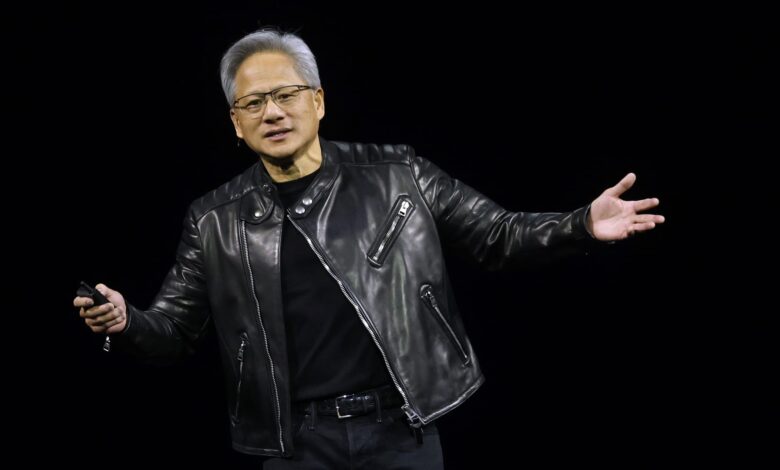Nvidia says it will record $5.5 billion charge for H20 GPUs to China

Nvidia CEO Jensen Huang delivers the keynote address during the Nvidia GTC 2025 at SAP Center on March 18, 2025 in San Jose, California.
Justin Sullivan | Getty Images
Nvidia stated on Tuesday that it will incur a quarterly charge of approximately $5.5 billion related to exporting H20 graphics processing units to China and other destinations. The stock experienced a decline of over 6% in after-hours trading.
On April 9, the U.S. government notified Nvidia that a license would be necessary to export the chips to China and a few other countries, as per a filing made by the company.
This development indicates a potential slowdown in Nvidia’s growth due to heightened export restrictions on its chips, which are deemed capable of powering supercomputers for military purposes by the U.S. government. Nvidia is scheduled to report its fiscal first-quarter results on May 28.
Under President Biden’s administration, the U.S. imposed restrictions on AI chip exports in 2022 and subsequently updated the regulations the following year to prohibit the sale of more advanced AI processors. The H20 chip, designed for China, was developed to comply with U.S. export controls and generated an estimated $12 billion to $15 billion in revenue in 2024.
Nvidia CEO Jensen Huang mentioned during the company’s last quarterly earnings call in February that revenue from China had halved compared to pre-export control levels. Huang cautioned about increasing competition in China and, for the second consecutive year, identified Nvidia listed Huawei as a competitor in its annual filing.
According to the company’s annual report, China ranks as Nvidia’s fourth-largest region by sales, trailing behind the U.S., Singapore, and Taiwan. More than half of its sales were to U.S. companies in the fiscal year ending in January.
The H20 chip from Nvidia is similar to the H100 and H200 AI chips used in the U.S. and other countries but has slower interconnection speeds and bandwidth. It is based on a prior generation of AI architecture known as Hopper, introduced in 2022. Nvidia is now concentrating on marketing its current generation of AI chips, known as Blackwell.
DeepSeek, the Chinese firm that disrupted markets with its competitive AI model R1 earlier this year, utilized H20 chips in its research.
In addition to the existing Chinese export controls, Nvidia is also confronted with new restrictions on its exports starting next month, under “AI diffusion rules” initially proposed by the Biden administration.
Nvidia has argued that further controls on its chips could hinder competition and potentially undermine U.S. competitiveness in technology. The company had previously indicated that it relocated some of its operations, including testing and distribution, out of China following the 2022 export controls.
During the company’s annual conference last month, when questioned about Chinese export controls, Huang emphasized that Nvidia strives to adhere to the law, but also highlighted that about half of the world’s AI researchers originate from China, with many of them working at U.S.-based AI labs.
Nvidia disclosed in Tuesday’s filing that the U.S. government informed the company on Monday that the license requirement for H20 chips would remain in effect “for the indefinite future.”
Nvidia shares have declined by 16% this year, largely attributed to President Trump’s announcement of broad tariffs on key trading partners. Despite exemptions granted on various electronic products, including smartphones, computers, and semiconductors, Trump and some officials stated over the weekend that the exemption was temporary and part of plans to impose separate tariffs on the sector.
Shares of Advanced Micro Devices saw a decline of over 7% in after-hours trading on Tuesday following Nvidia’s announcement. AI chipmaker Broadcom also experienced a drop of nearly 4%.
WATCH: Nvidia says U.S. requires license to export H20 products to China





